Friends of Croatia: Japanese Embassy - Friendly Relations between Croatia and Japan
June 17, 2021 -The eighth article in the series, "Friends of Croatia: Japanese Embassy", saw TCN reporter Ivor Kruljac sit down with Japanese Ambassador Misako Kaji and discuss all things regarding diplomatic relations between Japan and Croatia. Overall, Croatia and Japan are friendly countries with many shared values. With Croats and their expertise in improvisation and the excellent crisis response of the Japanese, the two countries can benefit greatly by learning from each other.
Croatia and Japan officially established diplomatic relations on March the 5th, 1993.
I was nervous while the taxi drove me to the Ambassador's residence. Japan is known for punctuality, and I worried whether or not I'd manage to make it on time as my cab was trying to break through Zagreb's midday rush. But in the end, I managed to arrive ahead of schedule. It was great that I wasn't late, but that's still clearly a very far cry from the punctuality of a country where a train conductor apologised when the train left the station 25 seconds ahead of schedule.
As I was rewinding the questions I had prepared in my head, I thought about greeting my interlocutor-to-be. Handshakes are a bit of a risky thing due to the coronavirus pandemic, but even if that annoying virus was somehow erased from existence, in Japanese culture, people would still greet each other by bowing. Do I need to bow, or does the Ambassador need to follow the Croatian culture of handshaking (or perhaps bumping fists in these pandemic-dominated times)?
Cultural Attache, Yutaro Nishida welcomed me to the premises, and at last, introduced me to the Japanese Ambassador Misako Kaji, who welcomed me with a smile, respect, and kindness. The debate on whether to bow or fist-bump was resolved by doing both, with both sides respecting and accepting each-others cultural background. For safety, I kept my mask on while the Ambassador removed hers so that her voice could be more clear as the interview was recorded. I moved my mask only occasionally to drink the amazing traditional green tea that was served during the interview, which was paired well with a warm and friendly atmosphere from the official representative of Japan in Croatia.
Misako Kaji graduated with a BA in the economy at the University of Tokyo, followed by an MA in philosophy, politics, and economy at no less than Oxford University. Inside the Japanese Ministry of Foreign Affairs, she served in the Japanese Embassies in the UK and Vietnam, but also in Japanese EU and UN missions. As an Ambassador and deputy of the main representative, Kaji also served in Japan's Delegation to international organisations in Geneva. In Japan, she was the deputy spokesperson for the Japanese Prime Minister and was a professor at the Tokyo and Hitotsubashi Universities. Ambassador Kaji also has quite some experience with the United Nations (UN). She was a special advisor of the high committee of the UN Refugee Agency (UNHCR) as well as a member of the UN Advisory Committee on Administrative and Budgetary Questions and a member of the advisory committee of the UN Peacebuilding Fund. She has represented Japan in Croatia since May 2019. Two years and twenty days, as she stated on the day of the interview that occurred last Friday.
Japanese culture is beloved in Croatia
''If you'd asked me a year ago, I would've said the Adriatic sea, the scenery, and the colour blue, all of these wonderful UNESCO heritage sites and nice people ready to help when you're travelling,'' started Ambassador Kaji, explaining what she had found most interesting and impressive in Croatia.
''But, after two years, I have something more to say, and what I like about Croatia is the 'Japan' I encounter in Croatia, and that is a very positive discovery. I didn't realise Japanese culture was so widely embodied in a variety of Croatian minds,'' noted ambassador Kaji.
The most recent instance was last week's handover ceremony of the Foreign Minister's Commendation to the Croatian Origami Society, which took place at the Ambassador's residence. Some of the members have been engaged with this artistic papercraft (taught in Japanese kindergarten) for over 20 years now.
''They are very much interested and dedicated without being imposed or forced to be, and its members included chemistry students, medical doctors, and even an 11-year-old boy. There were so many different categories of profession, and some even folded Origami while on probation, and that is where they'd encountered the art of origami,'' continued the Ambassador, fascinated with such love for one of the essentials of Japanese culture, keeping hold of plenty of works donated by participants of the ceremony.
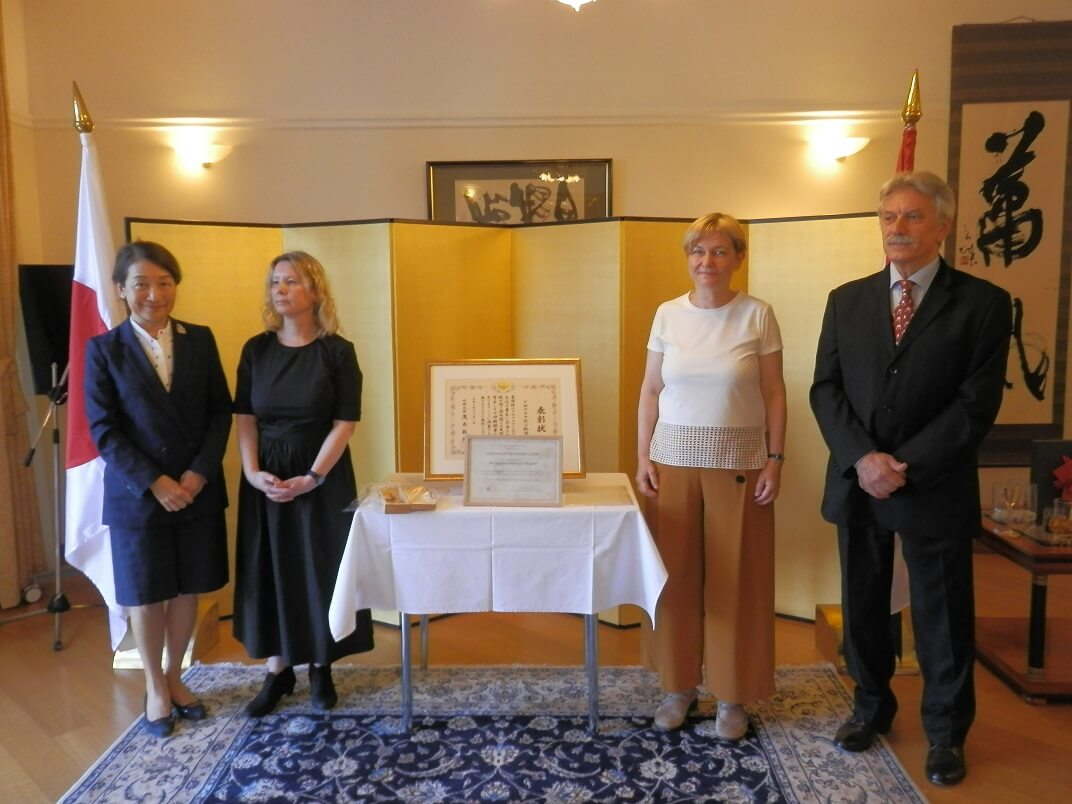
The handover ceremony of the Foreign Minister's Commendation to the Croatian Origami Society, June 2021 © Japanese Embassy Croatia
She is also particularly delighted with Biograd na Moru, a Croatian city in the Zadar area that not only commemorates the Atom Bomb falling on Hiroshima and Nagasaki but also has a metal crane bird as a monument to this dreadful tragedy that occurred on August the 6th, 1945.
''There is a legend that cranes live for a thousand years, so they are often used as presents for somebody who has been met with disasters or illness. In Hiroshima, they have a thousand cranes (made in the origami technique) folded and presented for the wish of peace,'' explained the Ambassador. Such a ceremony was also seen in Biograd na Moru, initiated by mayor Ivan Knez with a large metal crane made to outlast paper for generations to come.
The Japanese martial art of Karate is also popular in Croatia with some quite good successes achieved by Croatian athletes. Last month, the European Karate Championships were held in Poreč, where Ambassador Kaji was invited and was again fascinated with the use of the Japanese language and overall traditions despite there not having been a single Japanese athlete present there.
With so much of Japanese culture being present here in Croatia, it's difficult to say what the most beloved aspect of Japanese culture is for the Croats.
Before the pandemic struck, Ambassador Kaji remembered the Japan Day event in Zagreb's popular Mimara Museum, which saw huge attendance and a presentation on Japanese food, sake (Japanese rice schnapps) degustation, Ikebana (flower art), a tea ceremony, bonsai (aesthetical horticultural shaping of small trees), martial arts such as Karate, Judo, Kendo, haiku poetry workshops, calligraphy, Igo chess and much more.
2019 was also a big year for a Japanese promotion with the 2020 Olympic Games, which saw Croatian athletes from the 1964 Olympics attend the promotion for 2020. Additionally, for Japan, as Ambassador Kaji pointed out, the Paralympic Games are an important measure for the general success of the Olympics, which was evident in the ParaBOX installation (where visitors were challenged to find a ball in complete darkness), and the presentation of the Japanese car company Toyota's car which is designed to be able to be driven by people with disabilities.
However, when it comes to younger people, particularly students of Japanology (which Croats can study at either Zagreb or Pula University), one cultural trend emerged.
''The Japanese language is very tricky to learn, so I asked one graduate student how she first encountered Japan and heard the language, and it was anime,'' Ambassador Kaji recalled. She added that the Japanese cartoon art of anime became pretty universal and is no longer limited only to Japan. (The same goes for Japanese comics such as manga, with both of these pieces of pop culture being incredibly diverse in genres and having something for everyone, covering all social groups and even not avoiding vivid graphic images of violence and/or sex).
''At the Foreign Ministry of Japan, we have an award from a world competition because of the promotion of manga, but without trying to focus or push deliberate energy into that promotion,'' stated Ambassador Kaji.
As Japanese pop culture, anime and manga are indeed very popular here in Croatia, which is visible at the Pandakon conference that is held annually at Zagreb's Močvara club. Fans often dress up as their favourite characters, and there are often rewards for the best cosplay.
However, there are also heated debates between fans and people in the manga/anime industry that also affect Croats. On the one hand, representatives of the anime and manga industry are unhappy with cosplay, viewing it as a copyright infringement and believing that fans should be paying for cosplaying these characters. On the other hand, fans say they are just trying to show love and appreciation for their work, and they are also promoting and attract new audiences. It's indeed true that someone might not know what is ''Deadman Wonderland'', but upon seeing a brilliantly crafted cosplay of Shiro, they may ask the cosplayer about the character and then watch anime or read manga.
Ambassador Kaji says the Japanese Government is aware of the problem.
''Earlier in January, the Minister for the "Cool Japan“ Strategy (with Cool Japan being a brand strategy, aiming to disseminate Japan's attractiveness and as a unique culture throughout the world), Shinji Inoue said that he was aware of an opinion among the cosplay community rising, and this could be a real legal problem. It was important to secure an environment in which people can enjoy cosplay at ease, without worrying about possibly breaching laws. So, the Minister declared that he would come up with ways to deal with it but has not yet specified what those ways will be,'' explained the Ambassador.
Friendly Nations: sharing values, but trade could be better...
The cosplay question is one of the political issues in Japan, but when it comes to politics, what exactly is going on between Croatia and Japan?
''We're friendly countries; we share the same values. Unfortunately, you can't speak your own mind in every country, but Croatia and Japan belong to those countries where you're free to have as many children as you want, free to say what you like, free to travel where you want, free to choose your own vocation. In other words, we're both free countries that share the same values, democracy, human rights, and rule of law,'' said Ambassador Kaji, adding there are occasional disagreements, but that is normal and nothing to worry about.
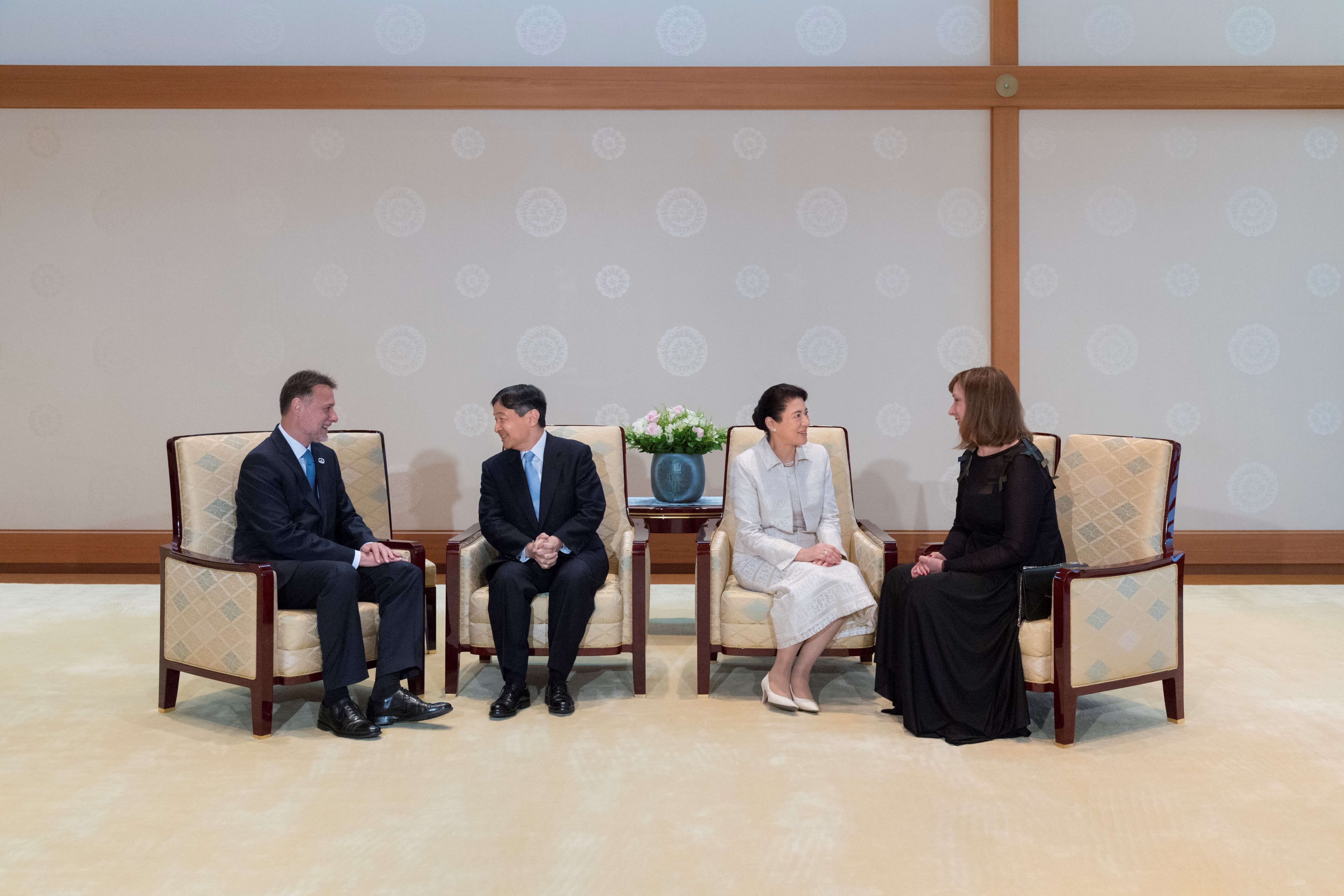
The Emperor and Empress of Japan grant an audience to the Speaker of the Croatian Parliament Gordan Jandroković and Mrs Jandroković during their visit to Japan upon the invitation of Speaker Oshima of the Japanese House of Representatives, June 2019 © The Imperial Household Agency
Kaji also pointed out that Croatia is pretty prevalent in Japan thanks to its sporting heroes. ''Everybody knows who Modrić and Čilić are; Croats are disproportionately present in world sport,'' she said.
Ambassador Kaji also rates Croatian EU membership as a great advantage.
''Through the EU, you're very well represented. When Croatia held the European Council Presidency during the first half of 2020, one of the most important parts of Croatian foreign policy concerned the Western Balkans and you advocated the EU's perspective for them as we don't want to roll back into a conflict or the changing of the borders after such a great sacrifice,'' Ambassador Kaji stated, referring to the war back in the '90s.
An important instance of that is the Zagreb Declaration from June the 22nd, 2020.
''We're part of the group that supports the European idea, and through that, the Croatian idea, as we share the same values,'' confirmed the Ambassador.
She added that while it may seem far away, the issues of the Balkans are relevant to such ideas like the Free and Open Indo-Pacific, and advocating the peace and freedom of nagivation, for example, is required on both locations, and Japan sees Croatia as a partner in that regard.
Ambassador Kaji also regularly contacts the Croatian Ministry of Foreign and European Affairs (MVEP), the Government, Parliament, the President's office, various cultural institutions, sports institutions such as the Croatian Judo Federation, the Croatian Karate Union, and the Croatian Olympic and Paralympic Committees, educational institutions, local government units and more. She also works on maintaining friendly ties with other ambassadors and diplomats in Croatia.
''My diplomatic colleagues know that only those who are blessed get to be stationed in Croatia,'' revealed Ambassador Kaji, not hiding her happiness for representing Japan in this Southeastern European country.
She is also particularly excited about going to Virovitica this week since she has never been. The visit is to attend the exhibition on Japanese pottery titled ''Yakishime: Earth Metamorphosis'' which is coming to Virovitica after already having been held in Vukovar and Pula.
Commenting on the most frequent contact she keeps in Croatia, she said that it's very hard to say, but statistically, maybe the Japanese Embassy communicates the most with MVEP. ''We're only two minutes away from the Ministry,'' said Ambassador Kaji.
Of course, not everything can be equally balanced and trade is unfortunately currently sitting on pretty low branches of the overall tree.
''When it comes to trade, we made up only 0.28% of Croatia's exports with tuna being a major portion - which is nice. In addition, when it comes to investments in Croatia, only 0.5% of all investments come from Japan. So there's room for improvement there,'' stated Ambassador Kaji with optimism.
Some of the instances of trading and business between the two countries can be seen in the Japan-based company Nipro taking over Piramida, a Croatian pharmaceutical packaging producer from Sesvete near the City of Zagreb last month.
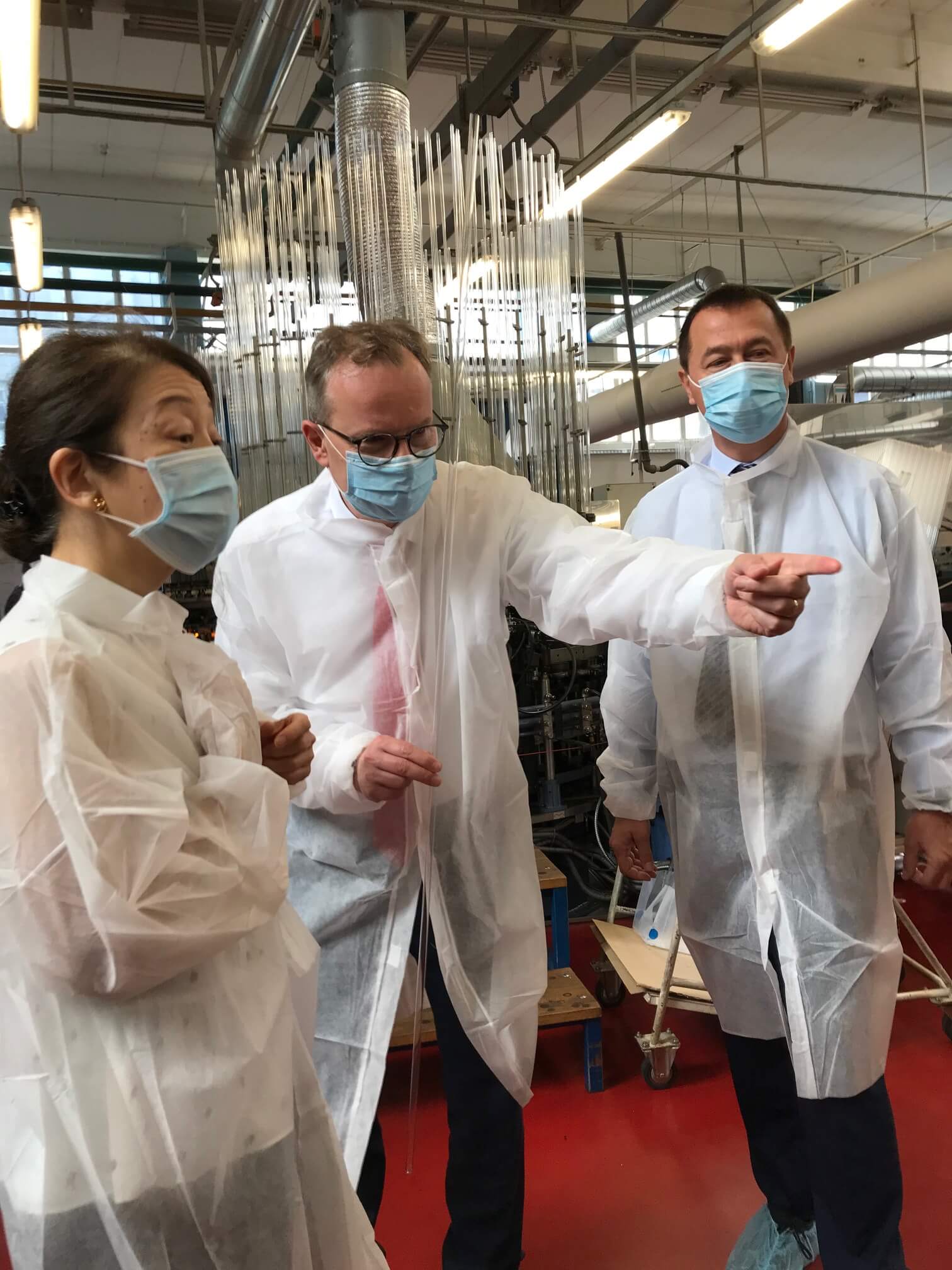
A visit to Nipro PharmaPackaging Croatia, June 2021 © Japanese Embassy Croatia
Knowledge – the way forward while not forgetting culture or tradition
As mentioned, Japanese culture is widely popular and much loved among Croats, the Japanese love Croatian athletes, and the two countries share friendly relations. Both Croatia and Japan have their traditions and cultural heritage. With ever-present technological development, some people in Croatia do fear that progress will lead to Croats forgetting their traditions, ways, and cultural heritage. On the other hand, Japan has seen huge technological development evident in very fast internet, modern trains, robotics, and more. Yet, their tradition and culture remain well preserved. What's the secret, and how can technological advancement be balanced with keeping a focus on tradition?
As Ambassador Kaji explained, the gist is to ''keep your spirit, but introduce technology''. While the Ambassador believes that the path of economic development makes sense in the long term, it wasn't always so easy. In the past, economic development was accompanied by pollution, and Japanese people, apart from developing health issues, entered an atmosphere that wasn't very kind to their traditional ways. But things have improved since then.
''In the 21st century, people and governments are more focused on green technologies and digital technologies which can be friendly towards and resonate with keeping up with traditions. Like when drinking tea, you have a ceremony, but the leaves for the green tea need to be carefully nourished in a kind environment, so that isn't very compatible with mass production or polluted air. But when, for example, you use the wind to produce energy, that's a nice eco-friendly way that co-exists with traditional culture,'' explained Ambassador Kaji.
She added that this way of co-existing then becomes mutually supportive and crafted to be resilient and long-lasting. That being said, new technologies also need to be carefully crafted to keep an eye on traditions, and improvisation is troubling in that regard.
''If you show respect for tradition, and you use academic knowledge or research, then there must be a way of remaining aligned with tradition and pursuing technology to have them both be mutually supportive,'' concluded Ambassador Kaji, and her belief about Croatia's technological development is that it will not be fatal to Croatian tradition.
Speaking of tradition, traditions form habits that then become accepted in various societies. With the already mentioned Japanese love for punctuality and the general perception of the Japanese as organised people that like order and plans, the perception of Croats can be quite the opposite. Many see Croats as laid back and relaxed, not making a fuss if they are a bit late. However, Ambassador Kaji sees a different picture of the Croats from her experience, particularly when it comes to Croatian women.
''A cleaning lady from Slavonia that comes to clean my office every day just starts working and cleans meticulously. She doesn't leave one small thing out and she is very responsible. In Japan, you don't see so many women gardening, and here, the women that watch over my garden are very powerful and professional, and that is very impressive,'' she noted. The work ethic and responsibility are something she sees with all of the Croats working for her.
''When it comes to Japan, we plan for perfection, so the dark side of that characteristics is, for instance, being late with the vaccination rollout. There are all sorts of verifications that take place there, making sure everyone can get them, and yes, they're proven safe abroad, but we had our own evaluations done, and that was the main reason we've been criticised for being too slow. Here in Croatia, you're really good at improvising. We can learn from each other,'' Ambassador Kaji said, sharing her observations on the habits of Croats and people in Japan.
She added that one such thing where Croatia can learn from Japan is crisis response, particularly when it comes to earthquakes.
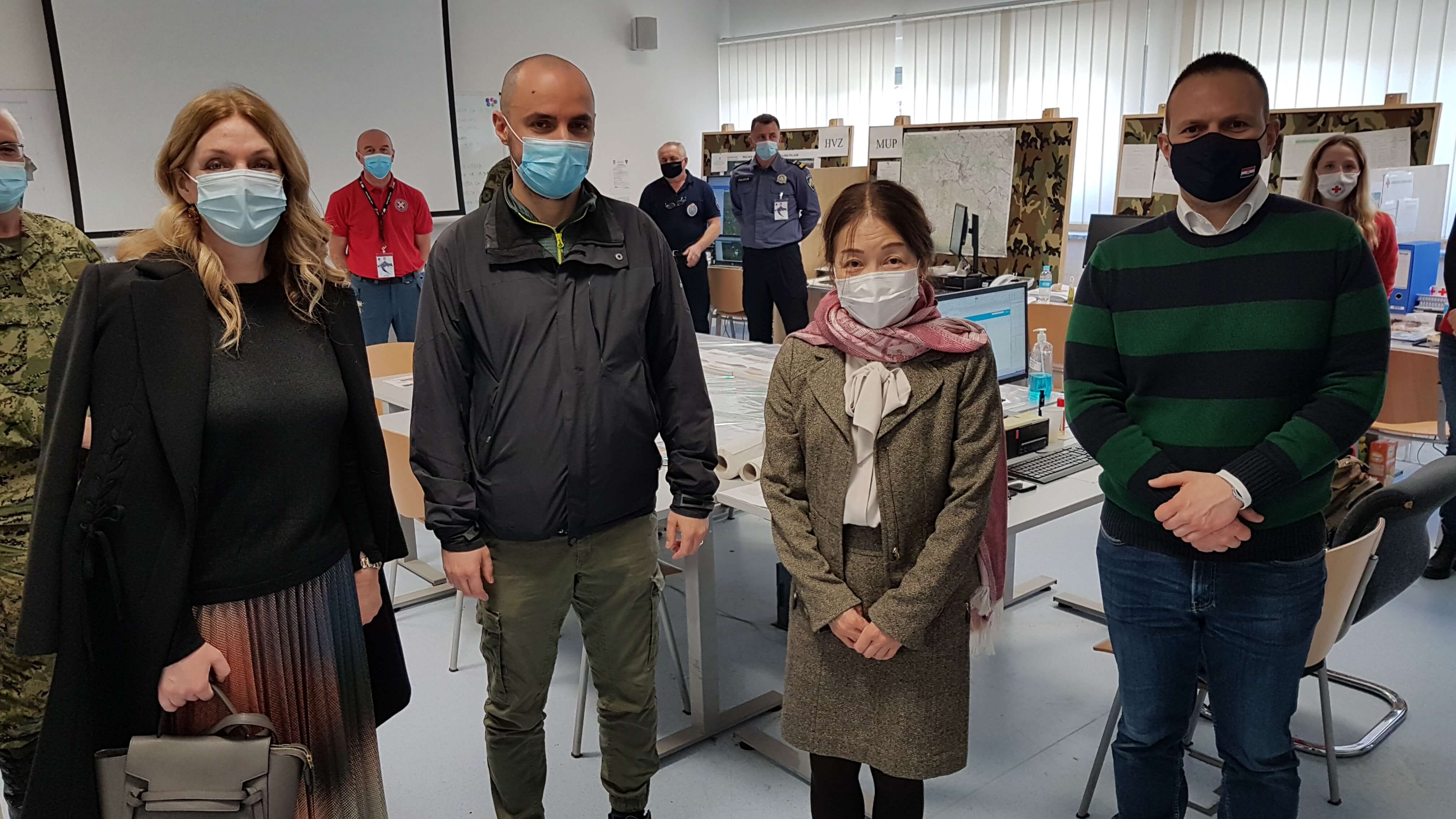
At the Civil Protection Headquarters for Dealing with the Aftermath of the Petrinja earthquake in December 2020, March 2021 © Japanese Embassy Croatia
Post-earthquake reconstruction by Japanese experts: Zagreb's buildings can keep their looks and also become safer
Japan is famous (or as Ambassador Kaji rated with a humorous touch, perhaps notorious) for regularly having earthquakes. Tsunamis happen as well. This was even noticed by reporters from the Croatian paper Jutarnji List, who, when following the earthquakes in Zagreb and Petrinja, interviewed Ambassador Kaji in search of advice on living with earthquakes. An equipped backpack with water, food, batteries, and lights ready for evacuation, along with agreeing on a location at which were to meet with your loved ones, are some great bits of advice for planning once you accept that earthquakes can happen at any time, anywhere.
''You can't stop earthquakes, but if you're prepared, you can mitigate the damage they cause and protect lives. People often think earthquakes happen, and that's that, but earthquakes are never over,'' said the Ambassador when recalling that interview.
''I was at my residence when the Zagreb earthquake happened more than one year ago, and the epicentre was just three kilometres away. It was pretty bad but not serious with only small cracks on the wall,'' recalled Ambassador Kaji, not seeming to feel unsafe in a Japanese earthquake-conscious building, while Croatia isn't always so aware that the Earth's plates can move and cause total chaos.
The earthquake that gave Zagreb such a heavy blow in March 2020 is a normal monthly, if not weekly, occurrence in Japan. The country's ultra-modern buildings and skyscrapers were built to sustain such rumbling, but even the traditional signature Japanese style of architecture (such as the signature Pagoda of Horyuji, the oldest wooden high-rise Japanese building built in 680A.D.) sustained numerous earthquakes over centuries, as Japanese builders always had to try to cope with earthquakes. But, with Zagreb being proud of its architecture, particularly in the downtown area, can the Croatian capital possibly preserve its signature look but also become safer for its residents if such magnitudes or higher strike once again?
''I asked some Japanese experts about whether or not it would be possible to preserve the nice, historic architecture of Zagreb and not just totally transform it into a modern but very common city, and they said it was possible. That needs investment, but there are ways to somewhat reinforce the basic structures and preserve their looks,'' assured Ambassador Kaji. She also added that the speed and focus of reconstruction is something Croatia can learn how to be better at from Japan.
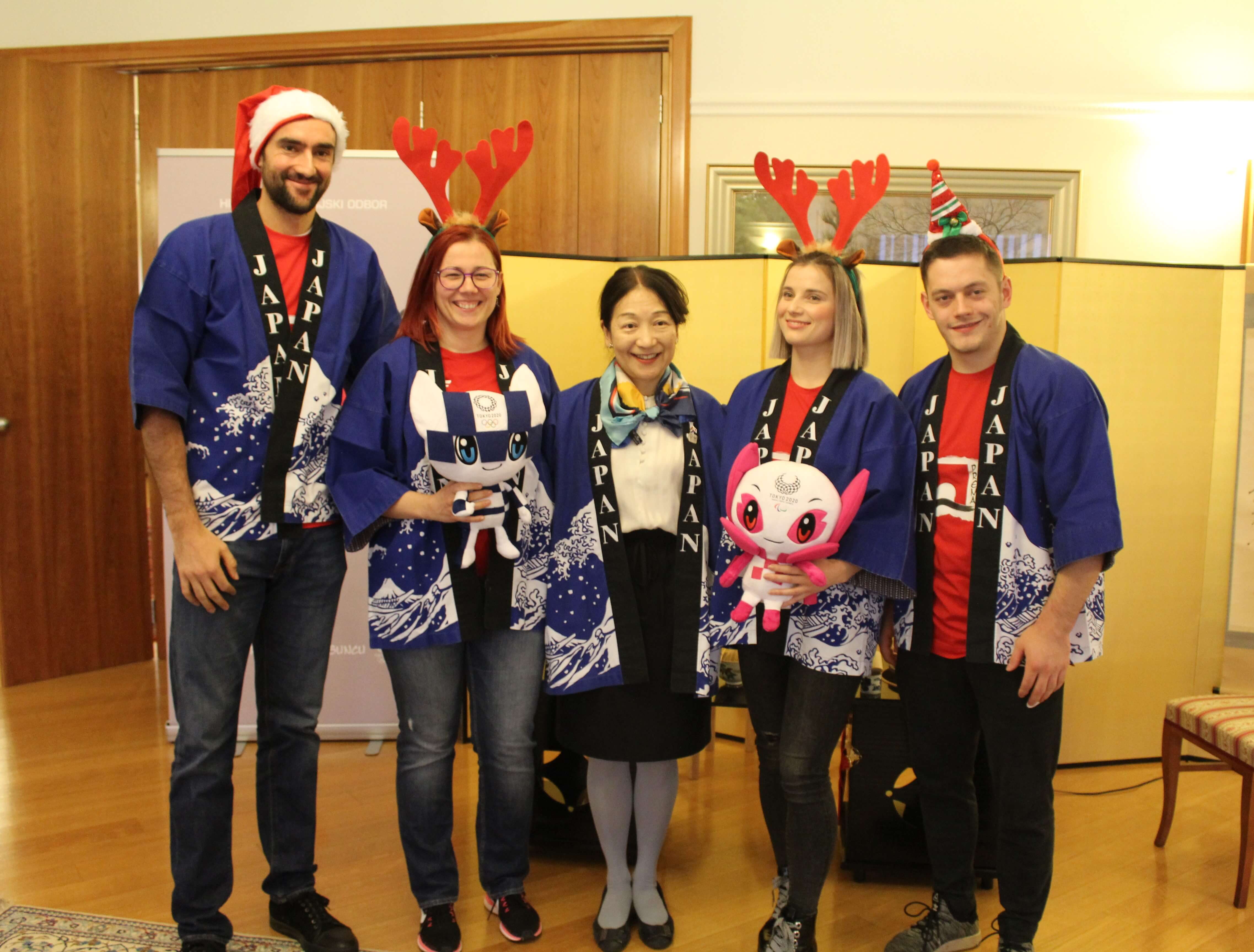
Towards the Tokyo 2020 Olympic and Paralympic Games, December 2019 © Japanese Embassy Croatia
The Adriatic is nice, but UNESCO heritage really excites Japanese people
With data acquired before coronavirus, Ambassador Kaji stated that there were 150 Japanese nationals living in Croatia, and 150,000 Japanese tourists visited the country. What several people noticed was that while many foreigners come to Croatia primarily to enjoy the coast and swim in the Croatian Adriatic, Japanese tourists can rarely be seen on the beach and prefer sightseeing.
''Japan is surrounded by the sea, so the sea isn't something amazing to them, but Japanese people are very interested in cultural heritage, and when something is recognised by UNESCO, people in Japan really rejoice. So, the Japanese are very much interested in historical or artistic values Croatia offers,'' explained Ambassador Kaji, clarifying why so many Japanese tourists can often be seen as frequently in continental Croatian towns and cities and not just on the coast.
Despite some Croats sometimes being a bit xenophobic or looking differently at people of other races, Ambassador Kaji was surprised when asked about whether there were any racial issues that Japanese people experienced and reported in Croatia.
''I don't know if things were different before regarding racial issues, but the story I heard when I came to Croatia was that back in 2011, many Croats gathered in front of the Embassy of Japan with flowers, candles, and cranes to express their grief and support regarding the Fukushima Tsunami and the earthquake,'' said Ambassador Kaji.
Just like those who came with flowers, the Embassy is equal and open, too. The Embassy issues scholarships for people wanting to study in Japan twice a year, and apart from being open to anyone that wants to travel to Japan and get informed about the country and visa requirements, the Embassy also has a library people are welcome to come to and read through Japanese books and literature.
Apart from being in regular contact with other colleagues based in Croatia, Ambassador Kaji also regularly contacts the Croatian Ambassador in Japan, Drazen Hrastic.
''Before I left Tokyo, we had dinner together, and now we talk often, as well,'' said Ambassador Kaji with a smile.
With Japanese culture being so appreciated in Croatia, and Croatian sporting heroes and UNESCO heritage being so beloved in Japan, spiced with common political values and friendly diplomatic relations, Croatia and Japan truly have the chance to learn from each other and continue to work on the further nurturing of their diplomatic ties, and their shared trade.
If you're a Japanese citizen or a Croatian citizen in need of information, here is how you can reach a Japanese diplomatic mission in Croatia:
In Zagreb:
Japanese Embassy
Adress: Boškovićeva 2
Mail:
Consular Section: This email address is being protected from spambots. You need JavaScript enabled to view it.
Political Section: This email address is being protected from spambots. You need JavaScript enabled to view it.
Economic Section: This email address is being protected from spambots. You need JavaScript enabled to view it.
Section of Culture / Public Relations: This email address is being protected from spambots. You need JavaScript enabled to view it.
Phone number: +385 1 48 70 650
In Split:
Consulate Office
Adress: Marasovićeva 67
Mail: This email address is being protected from spambots. You need JavaScript enabled to view it.
Phone number: +385 21 32 35 80
And of course, you can find all the latest news concerning Japanese-Croatian relations on the official website.
To read more from the series "Friends of Croatia", follow TCN's dedicated page.
For more about Japan - Croatia relations, follow TCN's dedicated page.
US Department of Homeland Security Officials in Croatia: Week-Long Visit Regarding Visa-Free Travel
June 15, 2021 - The US Department of Homeland Security officials in Croatia will continue to work in strengthening diplomatic relations with Croatia and ensuring visa-free travel between the two countries situated on opposite sides of the Atlantic.
Officials from the US Department of Homeland Security are currently in Croatia on a weeklong visit. As reported by US Embassy on social media, the visit is in regard to Croatia's progress towards Visa Waiver Programme Membership.
If Croatia joins the programme, Croatian citizens will not need a visa to travel to the USA for tourism, transit, or even for work as long as they don't extend the 90 day limit placed on their stay in the country.
As TCN reported earlier this year, The American Embassy in Croatia formally confirmed back in February that Croatian citizens will be able to finally enjoy the right to travel to the USA without the need for a visa later this year, by the 30th of September 2021 at the very latest, as was reported by Večernji list.
The final prerequisite for the removal of visa requirements was the issuing of 2000 further visas before the end of November 2020. Back then, sources inside the Croatian Ministry of Foreign Affairs revealed this criterion had been met, and thus the annual level of rejected applications will be less than 3%. That final bar was set by the USA to Croatia.
''Our two governments are continuing their close cooperation on meeting the requirements for the Visa Waiver Programme participation. US Department of Homeland Security officials are currently here, working with their Croatian Government partners on further advancing our shared goals, as well as addressing any remaining technical and policy requirements. People-to-people ties between the United States of America and the Republic of Croatia are robust,'' says the press release by the US Embassy in Zagreb.
They added that the US Embassy is continuing to focus on strengthening ties between the two countries and that Croatia is a trusted partner, and these new travel arrangements will also contribute to deepening bilateral relations.
This bit of news comes as a refreshment when taking into account some other recent events. Croatia and the USA enjoy a close connection thanks to their NATO membership, and recently, Croatian president Zoran Milanovic stated that he would not accept a NATO closing declaration if it failed to mention the Dayton agreement and Bosnia and Herzegovina's three constituent peoples.
That statement was criticised even by Željko Komšić, the Croatian member of the tripartite BiH Presidency, saying that ''the concept of constituent peoples in Bosnia and Herzegovina is obsolete.''
Additionally, a bit of challenge can be seen with the fact that while the US Embassy has a diplomatic mission in Croatia, there is no appointed Ambassador to Croatia at the moment. But nevertheless, cooperation and friendly relations between the two nations remain tight.
As TCN reported back in May, Croatia participated in a military exercise of transporting American military supplies, before that, in March, the US donated the GeneXpert Machine to Zagreb's Infectious Diseases Hospital and also invested $480,000 in the Upgrade of Rijeka's Offshore Emergency Response Centre.
In addition to their cooperation in terms of safety and health issues, the US additionally cooperated with the science-technology park - Step-Ri to bring entrepreneurship expertise to the Croats. With this diplomatic friendship evident and constantly being nourished, visa-free travel between the two countries is both fully deserved and now needed.
Learn more about visas in Croatia on our TC page.
For more about diplomacy in Croatia, follow TCN's dedicated page.
Croatian Tourism Minister Nikolina Brnjac Visits Bavaria to Discuss Tourism Cooperation
ZAGREB, 15 June, 2021 - Croatian Tourism Minister Nikolina Brnjac met with Bavaria's Deputy Premier and Minister of Economic Affairs, Regional Development and Energy, Hubert Aiwanger, in Munich on Monday to discuss ways of increasing cooperation in the tourism sector.
Brnjac said that Croatia and Bavaria would continue exchanging experience and best practice in the digitalisation of tourism services and the development of cultural and rural tourism, her ministry announced in a press release.
"Croatia and Bavaria put emphasis on the development of sustainable tourism, and their cooperation in many areas of common interest has been going on for about 50 years within the Bavarian-Croatian Commission," Brnjac said.
She noted that half of German tourists visiting Croatia come from Bavaria, which is why it is very important for Croatia to convey the information on the activities that are being undertaken so that Croatia is recognised as a pleasant and safe destination.
Bavaria supports Croatia's Schengen membership bid
Aiwanger said there was a lot of space for cooperation between Croatia and Bavaria in the tourism sector, emphasising that Bavaria supported Croatia's accession to the Schengen area next year as an important precondition for facilitating movement of tourists.
The working meeting was also attended by the deputy president of the ADAC motoring association for tourism and finance, Karlheinz Jungbeck.
Brnjac and Jungbeck discussed preparations for the summer tourist season as well as expectations and plans for future development. Brnjac said that the cooperation with ADAC, which has 22 million members, ensured the greater visibility of Croatia on the German market, adding that today's meeting set a framework for future institutional cooperation.
According to ADAC, there is a growing interest in visiting Croatia, notably in the camping segment. This year ADAC included 134 Croatian campsites on its list of the best European campsites, the same number as in 2019, and 13 of the campsites were rated as ADAC Superplatz 2021.
About 42,000 Germans are currently vacationing in Croatia, mostly in Istria. Last year German tourists generated 1.6 million arrivals and 12.7 overnight stays, which was 60 percent of overnight stays made in 2019 when a record 21.2 million overnight stays were generated by German visitors. Last year, the 12.7 million overnight stays made by German tourists accounted for 23 percent of total overnight stays in Croatia.
For more about politics in Croatia, follow TCN's dedicated page.
Foreign Minister Grlić Radman Attends Ministerial Meeting on Berlin Process
ZAGREB, 8 June, 2021 - Minister of Foreign and European Affairs Gordan Grlić Radman participated in a video-conference on Tuesday with the foreign ministers of country participants in the Berlin process, the foreign ministry has reported.
"The Berlin Process has so far resulted in many tangible achievements. Primarily, it has reiterated its commitment to the European Union's enlargement process, created a positive boost for concrete regional cooperation, and has helped to strengthen ties both between the six countries in the Western Balkans region as well as between those countries and the EU," said Grlić Radman.
He added that the area of the Western Balkans has been seriously affected by the COVID-19 pandemic but also that a recovery framework was created at last year's Berlin Process summit in Sofia.
"In times of crisis, we have to show solidarity with those who require help. Croatia is among the first EU member states to implement the vaccine sharing mechanism, via which we will send vaccines to Albania, Bosnia and Herzegovina, Kosovo, Montenegro and North Macedonia," underscored Grlić Radman.
He reiterated Croatia's support to Western Balkan countries on their European journey, reflecting particularly on Bosnia and Herzegovina, underscoring its stability which is Croatia's interest and of the whole of the European Union.
He underlined the urgency to resolve the most important issues in that country such as reforming the election law and the opportunity to implement that this year.
He called on those countries that have not yet recognised Kosovo to do so because of the positive effect that its recognition would have on the security and stability of Southeast Europe.
He also expressed hope that a consensus would be reached without any delay on the negotiation framework for Albania and North Macedonia and subsequently for an inter-governmental conference to be organised with both countries and for an inter-governmental conference to also be organised with Montenegro and Serbia in the context of the new negotiation methodology.
Today's meeting included the participation of representatives from EU institutions, the Council for Regional Cooperation and the regional youth cooperation office and the office for cooperation with NGOs.
Germany hosted today's video-conference of the Berlin Process, the foreign ministry said in its press release.
For more about politics in Croatia, follow TCN's dedicated page.
Friends of Croatia: Diplomatic Immunity
June 3, 2021 - The seventh article in the series, Friends of Croatia: Diplomatic Immunity brings you more details on diplomatic immunity, its boundaries, and examples of exceptions in accordance with the International Vienna Convention on Diplomatic Relations. Details on how the sentry Ministry of Foreign and European Affairs, are included too.
Being a diplomat isn't bad at all. You get to travel and explore the country you are assigned to, experience the new culture while promoting your own. Additionally, you work on improving bilateral relationships and contributing to the dynamic of the geopolitical scene (hopefully for the better).
Earlier in the series, there was an article dedicated to the key terms of diplomacy. But, there is one more thing that is worth giving special attention to: diplomatic immunity.
You probably might be thinking that means exemption from legal prosecution, and you are kinda right. But that doesn't just mean you can just do whatever you want, and law-abiding behavior is, of course, one of the needed characteristics to fit the job description.
In fact, the International Vienna Convention on Diplomatic Relations from 1961 has very clear instructions.
„The person of a diplomatic agent shall be inviolable. He shall not be liable to any form of arrest or detention. The receiving State (a State in which the diplomat is based) shall treat him with due respect and shall take all appropriate steps to prevent any attack on his person, freedom or dignity“, says article 29 of the Vienna convention. Its also worth adding that the same protection applies for his/her private residence, as well as papers and correspondence, and the diplomatic agent is also not obliged to give evidence as a witness.
But, for not everything to be all benefits and no responsibilities, article 31, despite repeating that „ a diplomatic agent shall enjoy immunity from the criminal jurisdiction of the receiving State and that diplomatic agent „shall also enjoy immunity from its civil and administrative jurisdiction“ – he lists exception. Such as in the event of a real action relating to private immovable property situated in the territory of the receiving State, (unless he holds it on behalf of the sending State for the purposes of the mission) or in the case of an action relating to succession in which the diplomatic agent is involved as executor, administrator, heir or legatee as a private person and not on behalf of the sending State and finally, in the event of an action relating to any professional or commercial activity exercised by the diplomatic agent in the receiving State outside his official functions.
Additionally, „the immunity of a diplomatic agent from the jurisdiction of the receiving State does not exempt him from the jurisdiction of the sending State“.
Ministry at your (diplomatic) service
With the Croatian Ministry of Foreign and European Affairs already stating for this series that they take diplomatic relations very seriously, they respect the convention, and their Diplomatic Protocol Office is here to help. As evident in their protocolar guide, they have an entire section dedicated to privilege and immunity.
„Diplomatic missions and international organizations accredited in the Republic of Croatia notify the Ministry of Foreign and European Affairs, to the Diplomatic protocol arrival of the (diplomatic) mission, attaching the diplomatic note, and the copy of the passport that will be notified“, states the guide in respects to the International Vienna Convention on Diplomatic Relations. The guide adds that when stepping on duty, the Diplomatic protocol will have a view in the passport of a notified person, and it will place a stamp with the following content that will confirm the passport was reviewed by the Ministry. Along with the date and signature to match. This leads to issuing a special identity card that then allows entering the Republic of Croatia without a visa.
„The special ID is issued to the members of missions and consulate offices, members of the UN organizations, and other specialized UN institutions, members of international organizations accredited in the Republic of Croatia, as well as members of their families or members of the shared household and members of private service“, elaborated the guide.
With the aforementioned documents, to get the ID, diplomats must also provide their photos and fill in a questionnaire which can be downloaded from the guide.
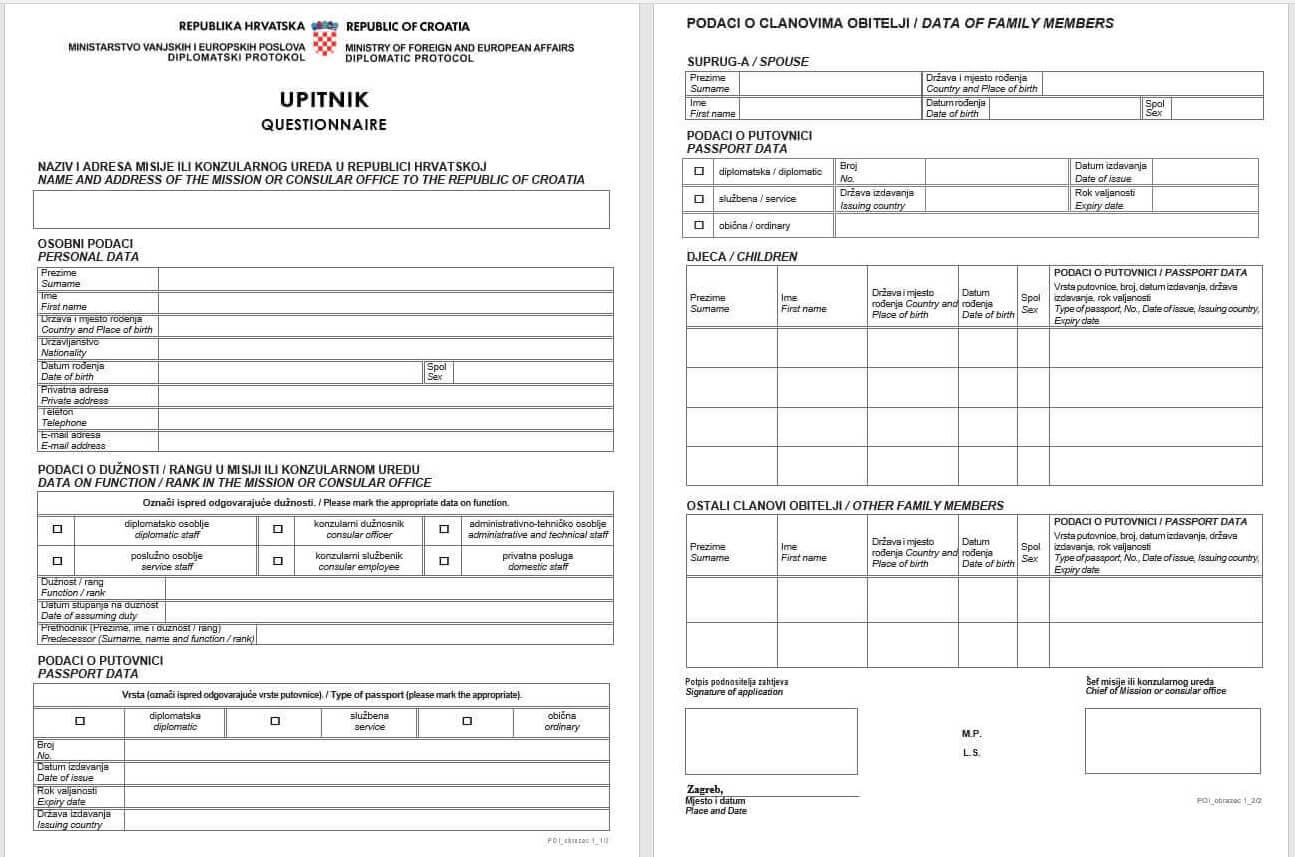
Diplomatic protocol questionnaire/screenshot, Total Croatia News
To read more from the series "Friends of Croatia", follow TCN's dedicated page.
For more about diplomacy in Croatia, follow TCN's dedicated page.
Interior Minister Davor Božinović : Croatia's Schengen membership in interest of EU
ZAGREB, 2 June, 2021 - Interior Minister Davor Božinović said on Wednesday that Croatia's entry to the passport-free Schengen Area was in the national interest as well as in the interest of the European Union.
Earlier on Wednesday the European Commission called for the enlargement of the Schengen area to include Croatia, Bulgaria and Romania, which have met all technical criteria for membership.
"Schengen's future must be marked by the expansion to those EU Member States that are not yet part of the Schengen area," the EC said while presenting the strategy for making the Schengen area stronger and more resilient.
Božinović recalled that Croatia had met 281 requirements in eight different segments concerning the membership criteria.
The minister is confident that Croatia will be admitted to the Schengen area in the next 12 months.
He said that he was glad to see that in Europe awareness was being raised about the importance of accession of Croatia, Romania and Bulgaria.
40,000 EU Digital COVID certificates issued in Croatia since first day of issuance
Since yesterday, when the issuance of EU Digital COVID certificates started in Croatia, as many as 40,000 such travel passes have been issued.
Božinović said that Croatia was among the first EU countries to make this system operational.
The minister, who visited the Bregana border crossing to get acquainted with the functioning of the system of checking those certificates, said that it took only 10 seconds to check those certificates.
One million kuna has been invested in this project, which included IT solutions, the necessary equipment of border crossings to be able to read the codes from the certificates, and other equipment for the Croatian Health Insurance Agency (HZZO), he said.
Croatia tapped EU funds for this purpose, Božinović said at Bregana.
ENTER Croatia application available to people travelling to Croatia
The minister said that people traveling to Croatia can fill in the ENTER Croatia application which will also facilitate passage across the border.
New, relaxed rules for arrivals in Croatia
As of today, some relaxed rules go into force for arrivals in Croatia, including a negative PCR test for coronavirus not older than 72 hours, while travellers who have received at least one vaccine dose at least 22 days before their arrival do not need to self-isolate.
For more about diplomacy in Croatia, follow TCN's dedicated page.
Summer Business School: A Chance for Entrepreneurs at Step-Ri Science-Technology Park
May 27, 2021 - This June, a five-day Summer Business School organized by Step-Ri Science-Technology Park and the American Embassy in Croatia makes Rijeka the place for entrepreneurs.
Science parks, research parks or technology parks or less intriguingly known as innovation centers, are a purpose-built cluster of office spaces, labs, workrooms, and meeting areas designed to support research and development in science and tech, says Bidwells, one of the UK's most reputable property consultancy companies. Common infrastructures worldwide and in Europe, the biggest city in Kvarner, Rijeka, is no exception in having one.
Step-Ri is a science-technology park, part of the University in Rijeka, and a place where science and economy meet to encourage entrepreneurship based on knowledge and new technologies.
„As one of the leading institutions in Croatia when it comes to entrepreneurship, Step Ri brings the newest knowledge in innovation and management from around the world through interesting education and business consulting. With our knowledge and experience, singlehandedly and with the help of the international network of partners and friends, we create projects and specialized programs to encourage entrepreneurship initiatives for both employed and unemployed, students, and the scientific community. With new services, business models, personal and organizational competencies, we make already successful entrepreneurs more competitive“, says Step-Ri's official website.
One example of such initiatives is the upcoming Summer Business Camp which will take place from June 23-27. And what's more interesting, this five-day program is brought to Step-Ri in collaboration with the American Embassy in Croatia.
„Summer Business Camp brings teams from all Croatia that want to improve or refine their business ideas and solutions through exercises, lectures, and individual coaching, “says Step Ri, promising extraordinary mentoring from successful entrepreneurs and investors.
This year, special attention will be given to the gaming startups, but other industries are also welcome. Regardless of whether you are already an entrepreneur or just aspiring to be one, you are welcome to apply if you have a developed business idea or a functional prototype.
Learning how to bulletproof your idea, experienced entrepreneur as a mentor, a chance to hear directly from investors what are they looking for and how to deliver it, valuable feedback and honest thoughts to accelerate your project, creating new opportunities, meeting other people in the business, and a having a good time- are some of the promises by Step-Ri for those who apply.
But, it would be best if you hurried, as June 6 is very close, and that's the deadline to beat. At least ten teams will be selected after a committee of experts evaluates project applications. Bed and breakfast accommodation for up to two team members, lunch at the venue, local bus tickets for getting to the venue, and a commemorative T-shirt await for those who are selected. And once in, a panel of venture capitalists, business angels, and business people will award the best with Apple iPad Pro (1st prize), Apple iPad Air 4 (2nd prize), and Apple iPad 8 (3rd prize).
Pieces of technologies such as the aforementioned above can certainly come in handy to entrepreneurs, but what about money? The actual finance for your projects?
„Many teams in the past received funding from participating investors and judges. However, nobody but you can answer that! Come and pitch your idea and see how far it will take you!“concludes Step-Ri regarding finance possibilities to turn your vision into a reality.
Learn more about Rijeka on our TC page.
For more about education in Croatia, follow TCN's dedicated page.
JANAF, OMV Sign First Oil Storage Contract
ZAGREB, 26 May, 2021 - The JANAF oil pipeline and storage system said on Wednesday it had signed its first contract with Austria's OMV Supply & Trading Ltd for storing up to 99,000 cubic metres of crude oil at the Omišalj Terminal for a period of two years.
Management said the contract confirmed JANAF's strong export orientation, adding that the company generated over 60% of its revenue from foreign clients.
The new contract ensures the further use of our storage capacity and stable business in the longer term, Management Board chairman Stjepan Adanić and Board member Vladislav Veslica said.
For more about diplomacy in Croatia, follow TCN's dedicated page.
Friends of Croatia: UNICEF - Croatia an Example to the World When it Comes to Breastfeeding
May 27, 2021 - The sixth article in the "Friends of Croatia: UNICEF" series explores the work of the UNICEF Office for Croatia. What is done regarding children's rights in Croatia, positives, and negatives, and how can you help if you want to?
To ensure that our world even stays the same, let alone improves, new generations are essential. But, before they grow old enough to participate in society, society must first take care of the youngest ones to grow and develop. Society must ensure for kids that they grow up in families filled with love, make sure that kids can go to school, that they are healthy, safe from violence, that they are not hungry or thirsty, and give them overall opportunity to make it in the world.
Basically, children have rights, and they are in more detail elaborated in 54 articles. For more details, have a look at the Convention on the Rights of the Child that came to power on September 2, 1990, by the United Nations (UN) General Assembly.
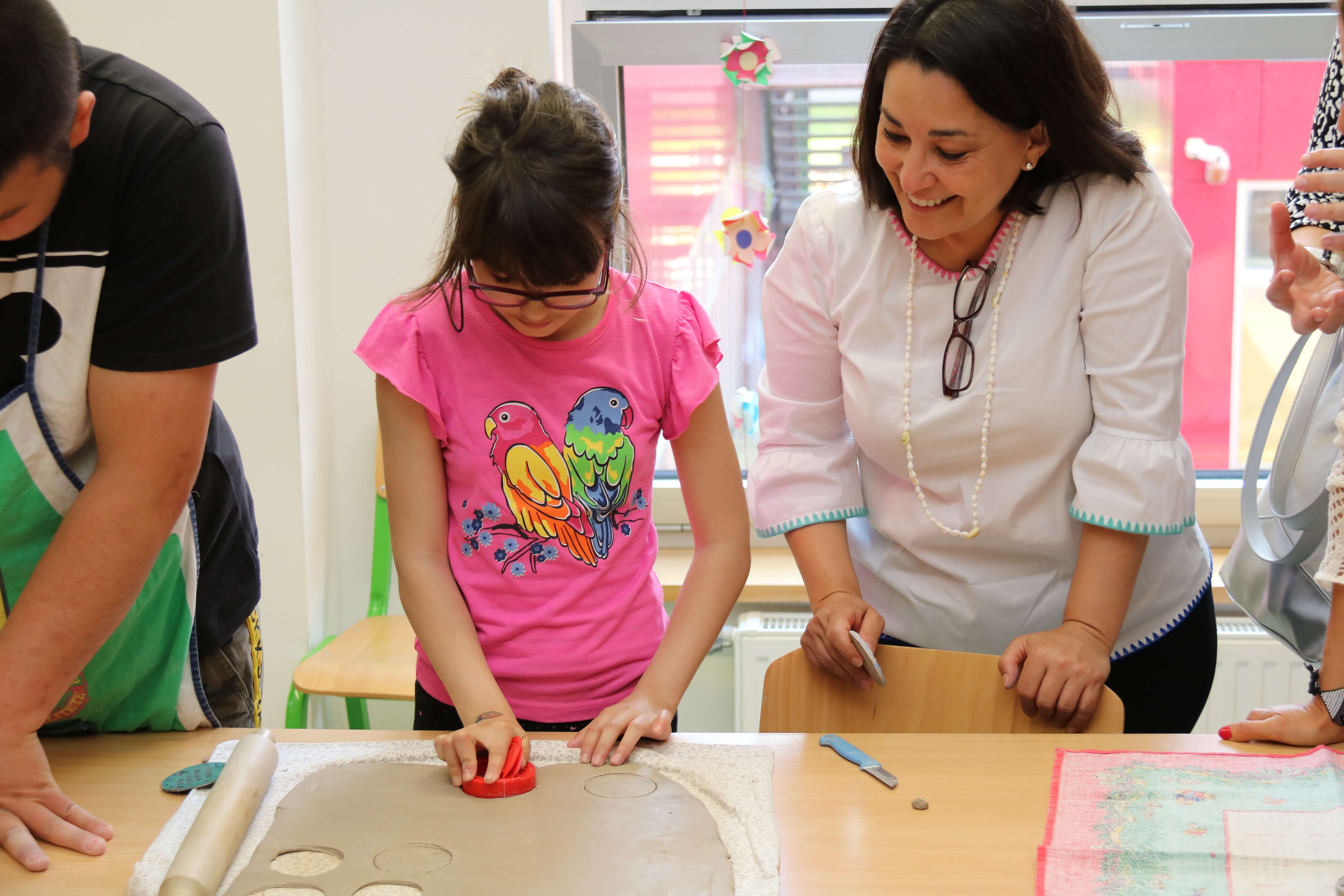
Regina M. Castillo, UNICEF office for Croatia representative with children with disabilities in Centre Tomislav Špoljar in Varaždin © Marin Ilej/UNICEF
The UN is dedicated to seeing this Convention is being respected, and United Nations International Children's Emergency Fund, commonly known as UNICEF, specializes in the issues of children's rights. Established in the aftermath of World War II, UNICEF has been at the frontlines of humanitarian crises, armed conflict, and natural disasters.
„Undeterred by the scale of the crises, we rise to the challenge, reimagine what is possible and respond by helping millions of children survive and thrive. Our on-the-ground expertise has reached more than 191 countries and territories, through committed partnerships and a passion for innovation“, says UNICEF on its official website.
Croatia signed and agreed with the Convention, and UNICEF today has its own office in Zagreb. Furthermore, it's worth noting that UNICEF has existed for 75 years, and despite firstly coming to Croatian territory while the country was part of the former Socialist Federal Republic of Yugoslavia, UNICEF has been with Croatia since the organization was established.
„Many people do not know that UNICEF helped to eradicate malaria in Croatia and that UNICEF played a key role in the development of modern dairy. Dairies were built in Zagreb, Rijeka, and Split, and factories for the production of powder milk in Osijek and Županja. Milk was distributed in schools, and for many children, it was their only meal during the day“, says Regina M. Castillo, UNICEF Office for Croatia representative.

Regina M. Castillo, UNICEF office for Croatia representative © Marin Ilej/UNICEF
The UNICEF representative is elected for a five-year mandate, and Regina M. Castillo came to her function in Croatia in 2019. Her career in the UN started in 2001 and was in charge of economic and social questions in the Executive Office of the UN chief secretary Kofi Annan in New York. This was followed by Castilla moving to work in the mutual program for HIV/AIDS, known as UNAIDS. She was first the director of private sector partnerships in Geneva (2006-2012) and then moved to be the director for Bolivia, Ecuador, and Peru (2012-2015). She majored in International relations and public politics.
Born in Nicaragua, she first started her career in the 1990s as a diplomat, and she was also the headmistress for international trade in the Nicaraguan Trading Ministry.
Helping Croatia before it was cool (or an independent country)
Castillo went on to continue that after World War 2, UNICEF fed six million children every day, which included many children in Croatia.
„One of those children was our dear colleague, prof. Josip Grgurić, who is still working tirelessly for the youngest. He still remembers the yellow cheese that was part of UNICEF's humanitarian package for families, as well as the chocolate that he then tasted for the first time. He later worked at the children's hospital in Klaićeva, which UNICEF helped found, and he still works hard on UNICEF’s Child-Friendly Hospital Initiative“, says Castillo indicating how valuable but also inspiring UNICEF can be to children. Castillo added that in the Homeland War, UNICEF was the first organization on the ground, making sure that children and families received the necessary psychosocial support and humanitarian packages. After the war, they educated children on how to protect themselves from landmines.
Today Croatia developed, joined NATO and EU, and is a modern European country. With such progress, there have been many improvements in respect to children and their rights.
„Croatia has a low mortality rate of children under the age of five, extremely low stunted growth rate due to inadequate nutrition in the first years of life and the enrolment rate of children in primary school is almost 100 per cent“, pointed out Castillo.
„Croatia is an example in the world when it comes to the promotion of breastfeeding. It is rare that all public maternity wards in a country have the status of 'Child-Friendly Hospital'. With the support of UNICEF, partners have organized a network of breastfeeding support groups, and now we have more than 200 support groups in Croatia“, added Castillo on what the world can look up to this small South-Eastern European country.
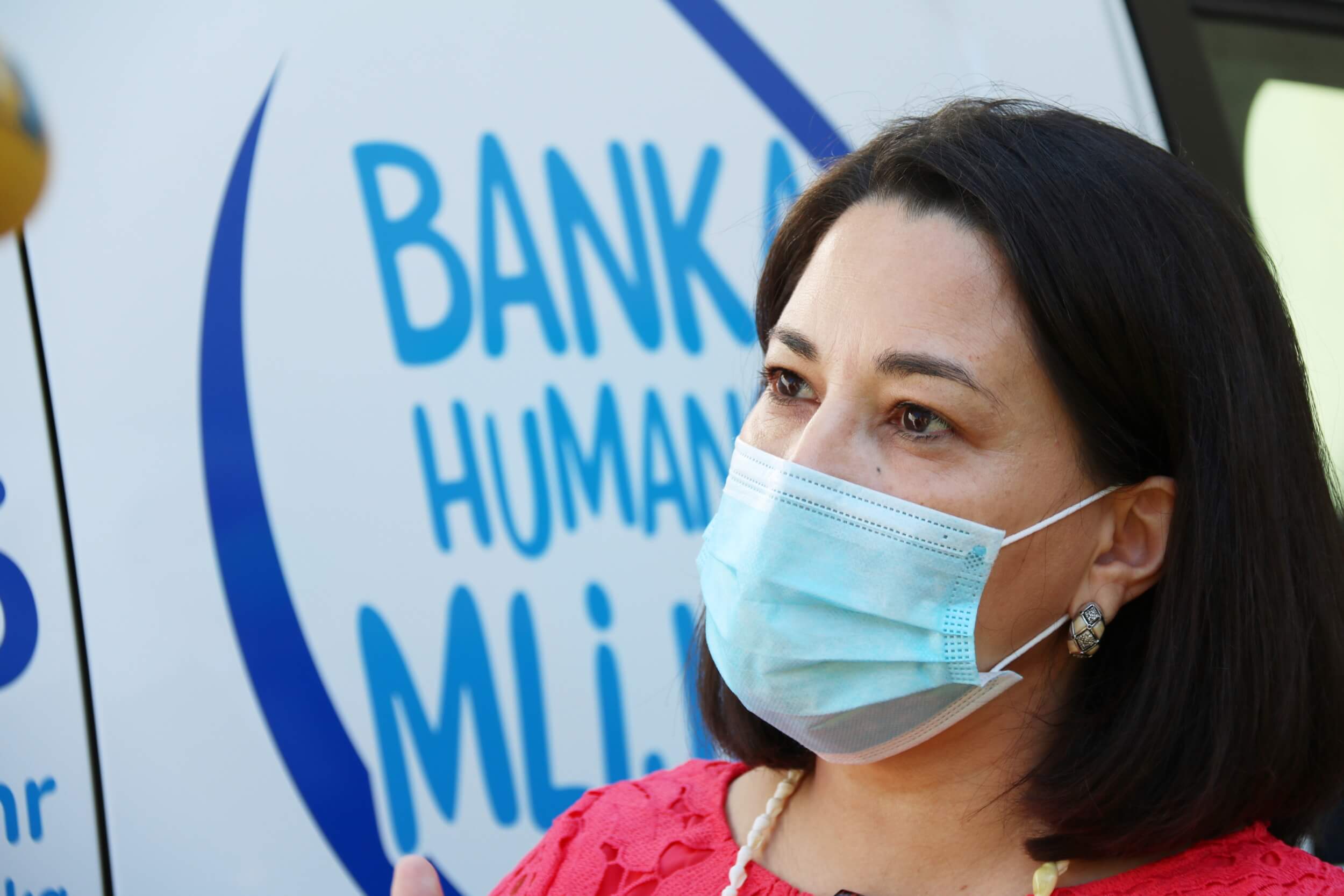
Regina M. Castillo at Human milk bank © Marin Ilej/UNICEF
Still, there are some issues Croatia needs to address and are far from ideal at the moment.
„There are still differences when it comes to access to services for children, depending on where they live and the conditions in which they grow up. Children with disabilities, as well as children from the poorest families, especially in rural areas, often do not have the opportunity to attend kindergarten and do not have the same access to specialized health services and therapies as children in urban areas. The focus of UNICEF in Croatia is on the most marginalized children: children with disabilities or developmental delays, children growing up without adequate parental care, children from minority groups, children at the risk of poverty and exclusion. UNICEF’s programs are focused on the well-being and protection of every child, with a special focus on the most vulnerable children“, pointed out Castillo.
Campaigns and programmes such as “Every child needs a family”, “The first three are the most important”, and “Stop violence among children” are perhaps the most known public action by UNICEF in Croatia, but returning to the good practices of breastfeeding, Castillo emphasizes the establishment of the Human Milk Bank in her current mandate.
„Thanks to the Human Milk Bank, prematurely born and seriously ill newborns (who do not have access to their own mother's milk) can receive milk donated by other mothers. We continually work on reducing the risk of disasters, support the development of quality foster care and provide support to parents in the upbringing and care of children through workshops and we work a lot with young people“, said Castillo.
In general, UNICEF has different types of offices in countries, and regarding the Croatian office, it’s a Country Office. In other words, most of the resources (human and financial) are invested in programs in Croatia. Castillo says that the five-year mandates have priorities that are determined in cooperation with partners. And while 80 percent of the funds raised are invested in programs for girls and boys in Croatia, there are funds and support programs for children outside of the country.
“For example, in 2018, UNICEF supported child health care in parts of Ukraine affected by the conflict and helped the building of five inclusive children's playgrounds in two refugee camps in Jordan in cooperation with the Ministry of Foreign and European Affairs in 2019. Through the ‘Schools for Africa’ program , which includes many kindergartens and schools throughout Croatia, UNICEF supports the education of girls and boys in Madagascar", Castillo listed several examples.

Regina M. Castillo, UNICEF office for Croatia representative with children on Media Literacy days press conference with Radovan Fuchs Minister of Science and Education, Krešimir Partl, State Secretary at Ministry of culture and media and Robert Tomljenović, Deputy Director of the Council for Electronic Media © Marin Ilej/UNICEF
Overall, the UNICEF Office for Croatia works closely with the Croatian Government, and most notably, with the Ministries of Social Welfare, Education, Health, and the Ministry of Foreign and European Affairs. Other partners also include experts (Croatian experts, but also building on expertise and good practice from all over the world), professional associations, academia, services providers, and NGOs.
“UNICEF’s goal is to connect all stakeholders and to advocate and support systemic change for the well-being of all children. System change is a gradual process, and it can be challenging, but when it comes to children’s rights, every step forward is well worth the effort”, explained Castillo.
Croatian citizens showing support for UNICEF
On one hand, Croatia is a good country with low mortality rates of kids and a role model for breastfeeding promotions. On the other hand, however, peer to peer violence (on whose suppression the aforementioned “Stop violence among children“ campaign works heavily on), and unequal approach to education between rural and urban areas show Croatia has both its ups and downs. Unfortunately. The downside sometimes overshadows all the positive things.
One such instance was the tragic death of a two-year-old girl from Nova Gradiška on Easter Sunday. The death of a severely injured girl, who was brought to Zagreb's children's hospital after suffering abuse and heavy beating from her biological parents (and from whom the girl was taken and given to a foster family but was then returned back to biological parents), sparked controversy and citizens outrage, culminating in changes in social welfare law, as well as sacks and investigations in the welfare center in Nova Gradiška.
„We are deeply saddened by the tragic death of two-and-a-half-year-old Nikoll on Easter Sunday. There are no words to express the pain of such a terrible event. Unfortunately, there are no simple and quick solutions to prevent violence against children. For years, UNICEF in Croatia has been continuously and persistently working in the field of child protection, educating experts from the social welfare system, but also other experts who work with children and families, such as experts from the health care, education, and justice systems. UNICEF implements various support programs for parents, and it is fully committed to the development of foster care and the improvement of the legislative framework. However, UNICEF is also aware that society as a whole, has a long way to go to achieve the goal that every girl and every boy is guaranteed the best possible care and protection. UNICEF will continue to work actively, persistently, and dedicatedly with all partners to achieve it”, commented Castillo.
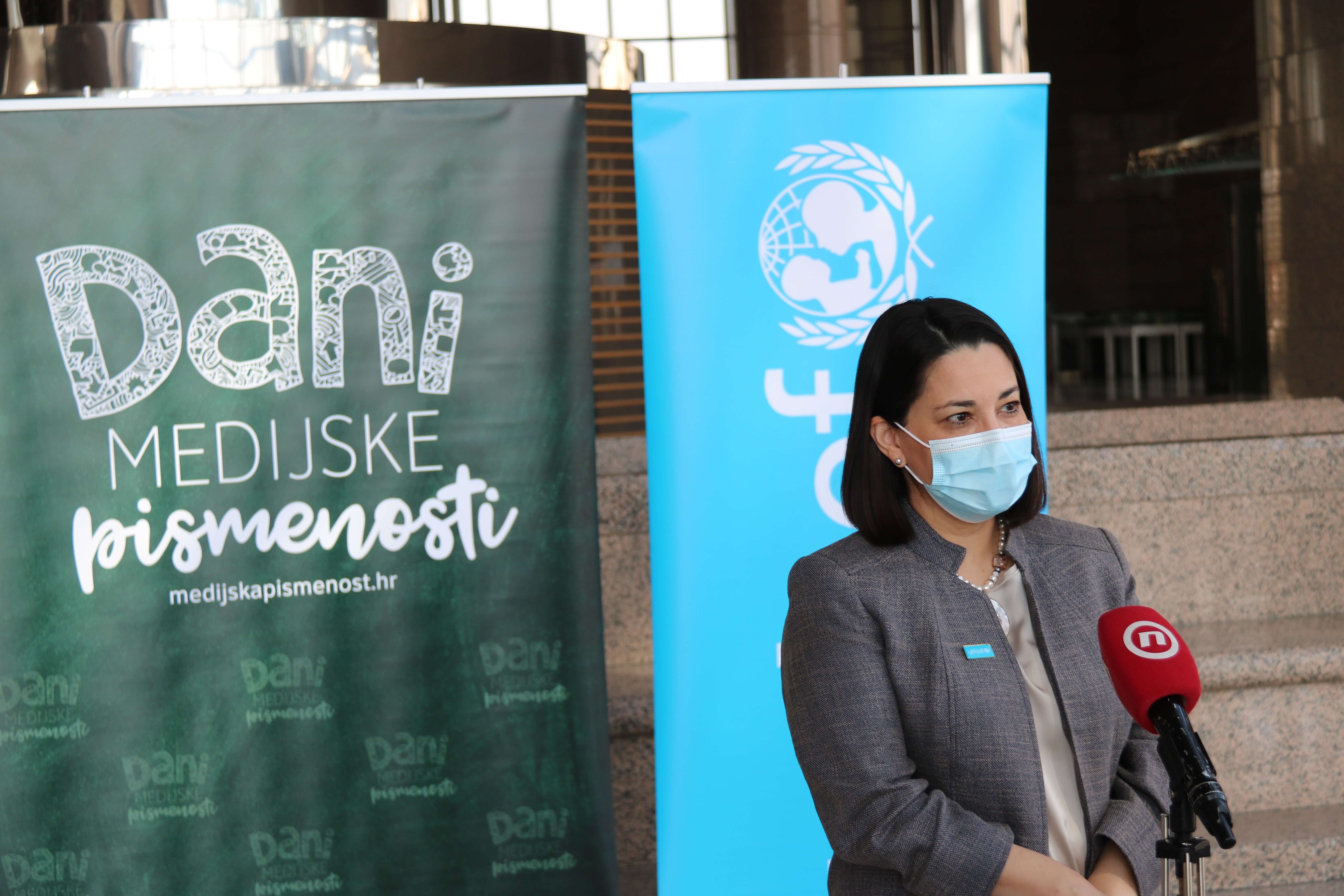
Regina M. Castillo talking on Media Literacy days press conference © Marin Ilej/UNICEF
However, Croatians recognize the importance of the UNICEF mission. Before Covid, UNICEF annually collaborated with the Museum of Illusions on the Museum of Reality exhibition which displayed the problems children faced worldwide, but which also showed what changes and solutions UNICEF brought to those areas.
“Experience tells us that citizens are ready to support the youngest, in Croatia and beyond. Implementation of our programs would not be possible without the support from citizens and companies that placed the focus of their CSR activities precisely on children. We especially value the support from our Childhood Guardians, donors who support our work with regular monthly donations and allow us to regularly conduct our programs for boys and girls, as well as react quickly with much-needed assistance in crisis situations like the earthquakes in Croatia and the COVID-19 pandemic that affected all families. UNICEF is always in the field with the most vulnerable children and their families”, notes Castillo.
In the end is important to note, that while children are recognised as a particularly vulnerable group, all human rights apply equally to children.
“All the rights enshrined in the Convention apply to every child, regardless of a child’s country of origin, gender, religion, and nationality. Every child, by birth, has all his/her rights, the right to grow up in a safe environment, to have a family, to have access to health care and education, to be able to play and develop his/her interests and reach his/her full potential”, concludes Castillo.
The five-year mandate is an agreement that sets priorities in advance, so Castillo warned that there is no opportunity for making donations outside of that framework. UNICEF office occasionally does get messages from citizens who need advice or help on issues outside of that frame, but nevertheless, UNICEF can offer them help by referring them to institutions and addresses that can offer citizens the necessary support, financial support, or information.
With expertise mentioned several times throughout this story as the insurance of delivering the best solutions to issues children face, UNICEF is always on the lookout for new people. If you want to make a change in the world while earning a fair wage yourself, check out what expertise UNICEF is looking for right now.
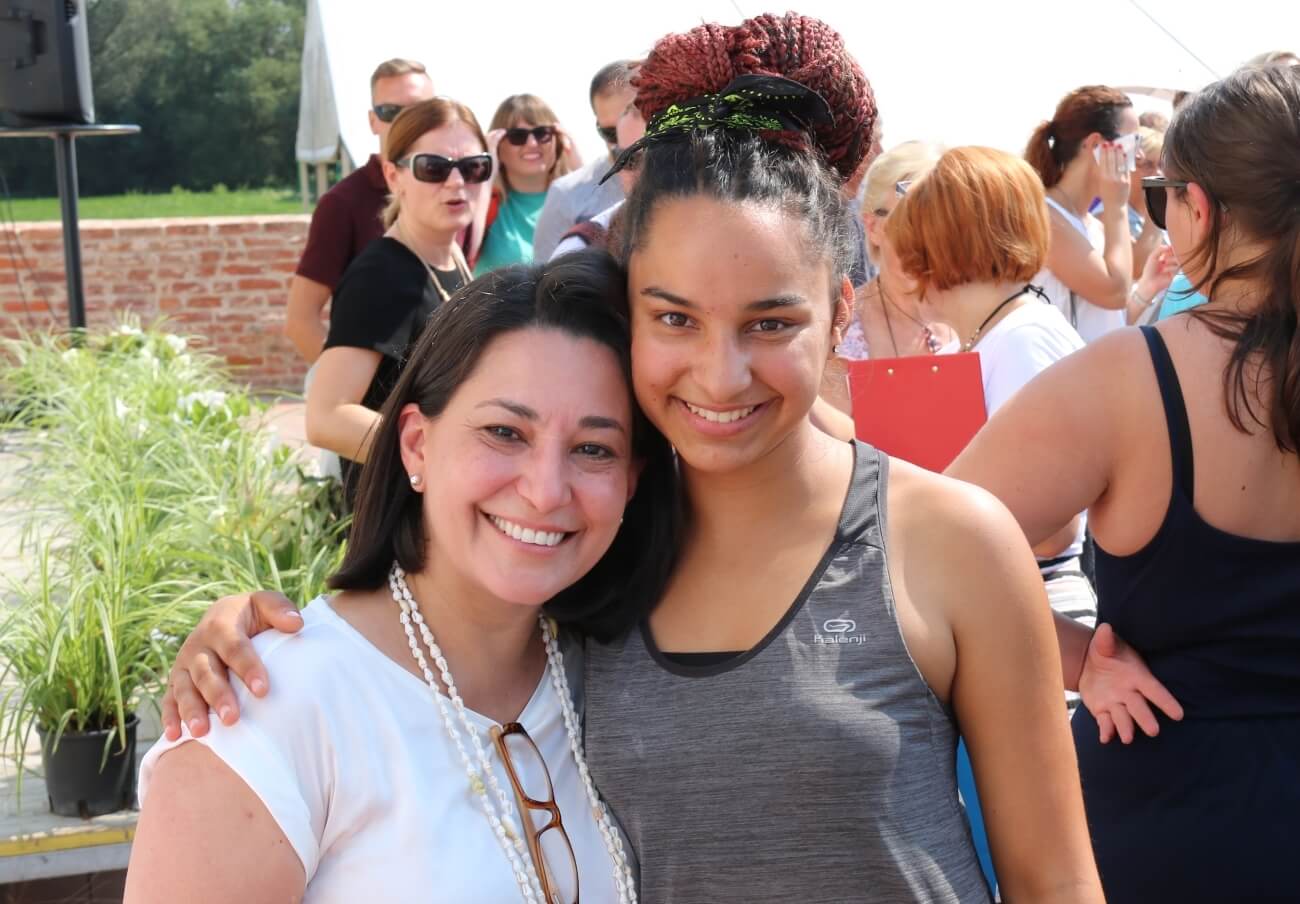
Regina M. Castillo on a foster family gathering © Marin Ilej/UNICEF
UNICEF Croatian Office is situated on Radnička cesta 41/7. To inform the public of their work, they built a considerable presence on Facebook, Twitter, Instagram, Youtube, and Linkedin. You can also find all UNICEF-related info for Croatia on their official website, and contact them via mail: This email address is being protected from spambots. You need JavaScript enabled to view it. or on phone numbers: +385 1 2442 660 and +385 1 2442 661. You can use the website to donate to a cause in Croatia too. Additionally, there are numbers: +385 1 4095 855, +385 99 2692 196, and +385 91 621 1039 for more details on donating to Croatia as well as e-mail address This email address is being protected from spambots. You need JavaScript enabled to view it.. You can also leave a donation to UNICEF in your will, and a phone number +385 1 3031 640 specializes for the issue in Croatia. If you find yourself in Croatia and you want to volunteer for UNICEF, more info can be found by sending a mail to This email address is being protected from spambots. You need JavaScript enabled to view it. and on phone number +385 1 3031 646.
And of course, you can donate for a good cause to UNICEF for any action the fund is internationally involved in.
To read more from the series "Friends of Croatia", follow TCN's dedicated page.
For more about UNICEF in Croatia, follow TCN's dedicated page.
Montenegrin Health Minister Jelena Borovinić Bojović Thanks Croatia For Vaccine Donation
ZAGREB, 25 May, 2021 - Montenegrin Health Minister Jelena Borovinić Bojović said in Zagreb on Tuesday that Croatia's donation of 10,000 vaccine doses was significant for Montenegro's efforts to inoculate its population against COVID-19.
In early May the Croatian government decided to donate 30,000 doses of coronavirus vaccines to Bosnia and Herzegovina and 10,000 doses each to Montenegro and Kosovo.
After meeting with her Croatian counterpart Vili Beroš, Borovinić Bojović thanked Croatia for that "big friendly gesture and great solidarity."
The donation of 10,000 doses will be "very significant in the process of mass inoculation that is currently underway in Montenegro," she said.
Croatia's Health Minister Vili Beroš underscored that Croatia's care for its neighbouring countries.
"I hope that we will contribute at least a little in the fight against this disease," said Beroš.
The two ministers discussed cooperation in the transplantation programme with Borovinić Bojović underscoring that Croatia has "shown especially good will to help us in resolving that problem."
She added that they discussed the signing of a memorandum of understanding that would enable Montenegrin doctors to come to Croatia for further training regarding transplantation surgeries.
The Croatian transplantation programme has been recognised beyond the borders of our country, said Beroš.
He underscored Croatia was willing to help Montenegro in that regard.
For more about politics in Croatia, follow TCN's dedicated page


